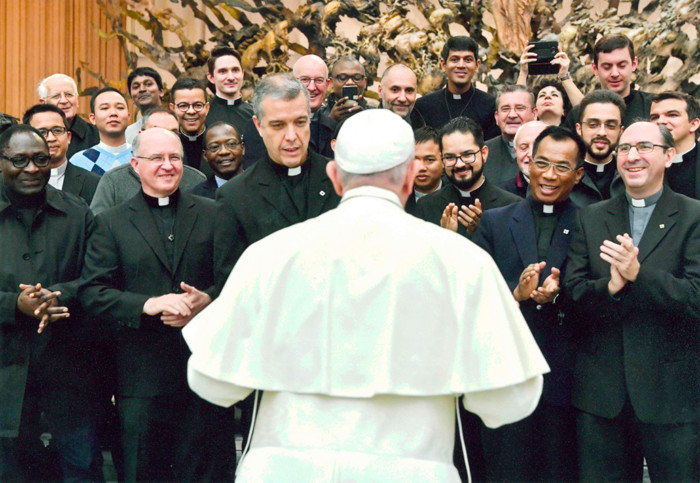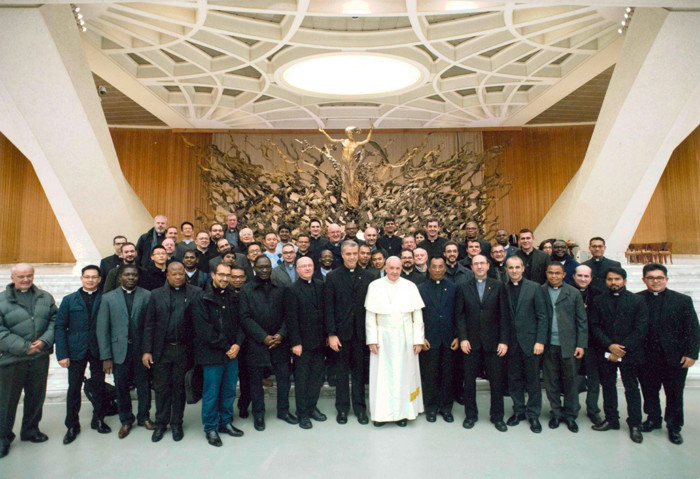Interview with the Superior General, Father Carlos Luis Suárez Codorniú, SCJ, on "Fratelli Tutti," the recent encyclical of Pope Francis.
Pope Francis’ encyclical “Fratelli tutti” has amazing parallels with the Dehonian spirituality and activity. How would you explain the encyclical in short words?
The encyclical is a pilgrimage through humanity. For me, the encyclical is a lectio divina on the parable of the Good Samaritan, a contemplation to reflect: Where are we going? How are we going? Whom do we meet? Who are we avoiding? We are always trying to reach a certain destination. But what happens along the way? When the Pope read this wonderful parable, he sits, as it was, on the edge of this path and takes the time to sense this pilgrimage.
What were your first thoughts when you read the encyclical?
It was as if a Dehonian had written it! (laughs) In fact, we immediately wrote a letter to the Congregation because we were so impressed by it. What we had read seems very familiar to us. Dehonians can feel at home in the text because it is about our spirituality. Father Dehon was also a traveler. For him, however, it wasn’t about tourism and getting to know new places. Traveling was his way of understanding the world. He made a lot of notes on his travels and that shows us the deep understanding that Father Dehon also sought: where we go, what gives us pleasure, that people take care of his companions because we are not alone. As the Pope says, “We are traveling companions.”
 And how did you feel as Superior General: Confirmed? Encouraged?
And how did you feel as Superior General: Confirmed? Encouraged?
Fratelli Tutti has encouraged me enormously. The encyclical is extremely helpful in strengthening our commitment. Sometimes we speak of the spiritual Dehon, the social Dehon, the historical Dehon – but in fact we consider the spirituality of Dehon as a whole. It expresses itself in a certain way of looking at the world, and that’s what the encyclical is about. It is rooted in an experience of faith, and on the basis of this experience one can go through life properly. That is still possible today! Around the world, we engage in many ways, but every action should be part of an inner experience of faith and God – because it is God who does something with us. Sometimes he comes close to us, sometimes he holds us back. When we discover what God is up to with us, we have to do it.
You said that the encyclical describes a path, a pilgrimage – but towards what goal? What is the Pope’s response?
We are called to love what makes us. To love our lives. To appreciate our gifts and talents. To enjoy our pilgrimage, to discover new faces and companions. Our existence has meaning, and we are not alone. How can YOU help me to become more human, a better man, a better woman? How can YOU help me to develop who I am? It is a wonderful pilgrimage of solidarity: let us walk together. This is the Sint Unum in our spirituality: that all be one! And a new way to read our Sint Unum. Fratelli Tutti is also a consistent continuation of the teachings of this Pope. All his letters have something in common: one helps the other to develop.
Pope Francis writes at one point (FT 127), “ We can aspire to a world that provides land, housing and work for all. This is the true path of peace…” What can a pope accomplish today in a predominantly secular, globalized, and fragmented world?
Francis’ way of being pope is closeness: to people, to the poorest. Especially the poorest need more closeness, and they get it from Pope Francis. To me, it is wonderful to read this parable and to feel this closeness. God also made us feel this closeness when the Word came into our world and became flesh. This is also important for our religious life, so that we stay together. What Pope Francis also shows is kindness. This joy of being kind to others and asking, “What do you want me to do to you?” That is what we take from Pope Francis’ teachings: Closeness and kindness. He shows us this through many gestures of friendship. He feels close to us, we belong to his family.
Closeness and friendliness are also characteristics of Dehonians. As a Dehonian, what is the most important thing you learned from “Fratelli Tutti”? What was new?
What was new for me was the courage to take a step back and see our spirituality in a new light. The Pope refers to the Gospel, and of course we know the Gospel very well. But now the Pope is shedding new light on the Gospel, offering us a new way of looking at it, and I think, “Oh my goodness, we’ve known the Pope for so long, but now he’s even closer to us. The Pope invites us to come even closer to him by saying: immerse yourself in the Gospel. That’s what Father Dehon also taught: immerse yourself in the Gospel. Be part of this parable. Be one of those who seek Jesus.
Pope Francis says, “ Let us take an active part in renewing and supporting our troubled societies” (FT 77). That sounds like it was taken directly from the Dehonians’ mission statement …
… but surely! This is reparation. We see broken societies. We see broken families. We see broken nations. We see so many wounded and injured people. The whole world is hurting. There is so much that needs to be repaired. The way to express our love to God is to show our love to the broken people in our context, in our time. The spirituality of reparation is absolutely present in this text. The Good Samaritan showed exactly that. He did his part to heal. We Dehonians are not the superman of humanity, but we are a small part of many great heroes in this world. We cannot take on all the burdens of this world, that would be presumptuous and frustrating, but we can do something. That is wonderful! And we ask very seriously: What can I do? Where is my wounded person? For which man, which woman, which child, can I be part of the healing?
When was the last time you felt you could do something?
Maybe two hours ago (laughs). I got a call from a confrere. He was very upset because of a misunderstanding with another confrere. I was just there for him, taking my time and saying: calm down, don’t take it so narrowly. Yes, I think that was the last time… I am convinced that each of us gets opportunities every day to be part of a solution.
How would you briefly summarize the similarities between Dehonian spirituality and “Fratelli Tutti”?
Someone loves us before we love – without asking for anything in return. Why did this one man of all men in the parable of the Good Samaritan stop that day? And the others didn’t? He knew nothing about the injured man, whether he was rich, for example, and would be able to pay him back later for his service. He did it simply out of the joy of doing something good for another. I think this is really very Dehonian. Looking at our founder, also in the concrete encounter with other people, with other religions, we learn: Don’t stop at doing the best for others. And do it without reciprocation, this is especially important in our time when it is always said: what do I get in return? We lose the joy of sacrificing ourselves.
There is a special connection between Pope Francis, his writings, his teachings, and the legacy of Father Dehon. What is this relationship?
Both have their feet firmly planted on the ground. They know the reality. They know: There are many painful moments in this world. But at the same time, they are men of hope. They know that they will not perish from sadness, violence, or selfishness. They know history is in God’s hands, and God will be the winner of history. But if someone wins, it means someone else will lose. Our way of winning is losing: my own projects, my personal comfort. “How to become a loser?” – that’s very hard in a society that’s mostly about winning. Read this book, do this course, and you will be a winner! No, I think the Gospel teaches us: be a loser! Lose the worst of you, and only then will you be really happy, only then will you be a real person!
This sounds very strange, especially in our Western societies: win by losing ….
… for sure! At one of our schools in Spain, I had a meeting with the teachers. I asked them to put up a big sign in front of the school with the words: come join us and become a loser! They were shocked …
… I can understand that!
I then tried to explain that this is the logic of the Gospel. The Good Samaritan was undoubtedly a winner. In the process, he lost money, lost time, and maybe missed a date and lost his girlfriend.
And what did he gain?
The joy of compassion. What it’s all about is compassion. We all have lots of good feelings. But what are good feelings? They don’t just pave the way for you. Compassion makes all the difference. The Good Samaritan felt, I’m not just a traveler, I’m a pilgrim. That is a difference. He is having an experience of God, not controlling every step, but letting the right things happen. A traveler plans where he will go, when he will stop, all the whens and wheres. A pilgrim, on the other hand, does not know where he will sleep tomorrow.
 Pope Francis wrote “Fratelli Tutti” before and during the Coronavirus pandemic. How much has the work of the Dehonians been affected by the pandemic? How can you still be a Good Samaritans in this pandemic?
Pope Francis wrote “Fratelli Tutti” before and during the Coronavirus pandemic. How much has the work of the Dehonians been affected by the pandemic? How can you still be a Good Samaritans in this pandemic?
Good question. Our Rule of Life requires the Superior General to visit all entities. For that, I should be constantly traveling around the globe, visiting about 50 different countries. I have not been able to do that for almost a year now. But we have found new possibilities in the General Administration with digital media. And we now have more time to pray, to think better, to reflect, to discuss. For me, the time here in the Roman community with about 40 confreres is a blessing! When I began my service to the Congregation, all I said everywhere was, “Hello!”, “Hello!”, “Goodbye!”, “Goodbye!” I was away most of the time. But now I’m here, getting to know my younger confreres. It’s a very different way to get to know the Congregation. But of course I have a desire to visit the entities again and embrace my confreres, to see their realities with my own eyes. I also suffer from this.
Does that mean you will be the first Superior General who will not have visited all the Entities during his term?
Well, Father Dehon also had this experience for three years during World War I. There he was only traveling between Brussels and St. Quentin. He had to give up his travels at a time when the Congregation was just developing in many places. This means that now I actually feel closer to Father Dehon.
I remember our first conversation right after your election, and I asked you about your main challenges. You answered: rediscovering the Gospel, rediscovering the legacy of our Founder, and rediscovering the Founder himself. You probably could not have imagined that rediscovering the Founder would happen in this kind of isolation.
Never! But it is precious! It helps immensely. Today, of course, we have the possibilities of technology. And the documents of Pope Francis – Fratelli Tutti, Evangelii Gaudium, Laudato Si’ – help us on the way to the Gospel. I feel blessed by these teachings. They help us to update our experience of the Gospel.
Immediately after the publication of the encyclical, you wrote a letter to the Congregation. Several articles have been published about it on the website dehoniani.org. What are your future plans for how Dehonians should work and live with this encyclical?
We invite all entities to read the encyclical starting from their own reality. For example, we also ask our schools to make something of Fratelli Tutti and Laudato Si’, because we believe that the two belong together. We have a lot of resources, we just have to use them properly. We have a lot of materials, and we have a lot of opportunities. The entities are taking this very seriously, and a number of concrete initiatives have already emerged.
Dein Reich Komme 60 (2021) 10-13.

Dein Reich Komme is the magazine of the Dehonians of the German province.




